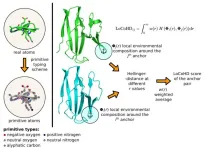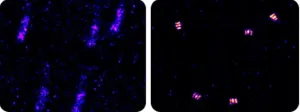(Press-News.org) Antibiotics prevent snails from forming new memories by disrupting their gut microbiome - the community of beneficial bacteria found in their guts.
The new research, led by the University of East Anglia (UEA) in collaboration with Aberystwyth University, highlights the damaging effects that human pollution could be having on aquatic wildlife.
In the study, pond snails were given a favourite food – carrot juice – but had to quickly learn and remember that it was no longer safe to eat.
Snails in clean water did well, avoiding feeding on the carrot juice when it had been paired with a chemical they dislike.
However, snails that had been exposed to high concentrations of antibiotics in the water failed to learn and form memory and continued to show normal feeding behaviour even after training.
Lead author Dr Gabrielle Davidson, of UEA’s School of Biological Sciences, said: “It’s well known that a healthy gut microbiome is important to human health, and our study is the first to show this is also the case in snails.”
The researchers found the antibiotics altered the gut microbiome substantially and changed the abundance of bacteria that have been found to relate to healthy memory formation in other animals, including humans.
This relationship between the bacteria found in the gut and brain function is called the microbiome-gut-brain axis. Chemicals produced by the good gut bacteria when breaking down food can improve brain health and cognitive function.
Reducing the abundance of these healthy bacteria in the gut prevents the gut microbiomes’ otherwise beneficial effects on the brain.
Previous studies on the link between the gut microbiome and brain function have focused on terrestrial species. However, aquatic wildlife is more likely to be directly impacted by antibiotic exposure in the environment.
Antibiotics are not removed effectively by waste treatment, and so enter the freshwater environment.
The antibiotic concentrations snails were exposed to in our experiment were at similar levels detected in freshwater in the UK, Europe and globally.
If freshwater pollution prevents snails from having a healthy microbiome, they won’t be able to use their brains to adjust their behaviour when they encounter new information.
Co-author Dr Sarah Dalesman, of Aberystwyth University, said: “Previous research has found pond snails have to learn about predators, what is good or bad to eat, and even remember who they have mated with.
“Anything that interferes with their memory will reduce their survival.”
The researchers say this is especially worrying in the face of the many new environmental challenges animals experience from human activities.
Dr Davidson added: “If we find this effect in snails, it is highly likely that antibiotics are having similar effects on other aquatic animals.
“We hope this study prompts greater emphasis on the importance of healthy gut microbiomes for wildlife and increases efforts to reduce the chemicals entering our environment.”
The study was funded by the Association for the Study of Animal Behaviour.
‘Antibiotic-altered gut microbiota explain plasticity in host memory and disrupt the covariation of pace-of-life traits in an aquatic snail’ is published in The ISME Journal: Multidisciplinary Journal of Microbial Ecology.
This research was carried out in accordance with the ASAB (Association for the Study of Animal Behaviour) Guidelines for the Treatment of Animals in Behavioural Research and Teaching.
Antibiotics prevent snails from forming new memories by disrupting their gut microbiome - the community of beneficial bacteria found in their guts.
The new research, led by the University of East Anglia (UEA) in collaboration with Aberystwyth University, highlights the damaging effects that human pollution could be having on aquatic wildlife.
In the study, pond snails were given a favourite food – carrot juice – but had to quickly learn and remember that it was no longer safe to eat.
Snails in clean water did well, avoiding feeding on the carrot juice when it had been paired with a chemical they dislike.
However, snails that had been exposed to high concentrations of antibiotics in the water failed to learn and form memory and continued to show normal feeding behaviour even after training.
Lead author Dr Gabrielle Davidson, of UEA’s School of Biological Sciences, said: “It’s well known that a healthy gut microbiome is important to human health, and our study is the first to show this is also the case in snails.”
The researchers found the antibiotics altered the gut microbiome substantially and changed the abundance of bacteria that have been found to relate to healthy memory formation in other animals, including humans.
This relationship between the bacteria found in the gut and brain function is called the microbiome-gut-brain axis. Chemicals produced by the good gut bacteria when breaking down food can improve brain health and cognitive function.
Reducing the abundance of these healthy bacteria in the gut prevents the gut microbiomes’ otherwise beneficial effects on the brain.
Previous studies on the link between the gut microbiome and brain function have focused on terrestrial species. However, aquatic wildlife is more likely to be directly impacted by antibiotic exposure in the environment.
Antibiotics are not removed effectively by waste treatment, and so enter the freshwater environment.
The antibiotic concentrations snails were exposed to in our experiment were at similar levels detected in freshwater in the UK, Europe and globally.
If freshwater pollution prevents snails from having a healthy microbiome, they won’t be able to use their brains to adjust their behaviour when they encounter new information.
Co-author Dr Sarah Dalesman, of Aberystwyth University, said: “Previous research has found pond snails have to learn about predators, what is good or bad to eat, and even remember who they have mated with.
“Anything that interferes with their memory will reduce their survival.”
The researchers say this is especially worrying in the face of the many new environmental challenges animals experience from human activities.
Dr Davidson added: “If we find this effect in snails, it is highly likely that antibiotics are having similar effects on other aquatic animals.
“We hope this study prompts greater emphasis on the importance of healthy gut microbiomes for wildlife and increases efforts to reduce the chemicals entering our environment.”
The study was funded by the Association for the Study of Animal Behaviour.
‘Antibiotic-altered gut microbiota explain plasticity in host memory and disrupt the covariation of pace-of-life traits in an aquatic snail’ is published in The ISME Journal: Multidisciplinary Journal of Microbial Ecology.
This research was carried out in accordance with the ASAB (Association for the Study of Animal Behaviour) Guidelines for the Treatment of Animals in Behavioural Research and Teaching.
END
Antibiotic pollution disrupts the gut microbiome and blocks memory in aquatic snails
2024-05-30
ELSE PRESS RELEASES FROM THIS DATE:
Researchers expose new symbiosis origin theories, identify experimental systems for plant life
2024-05-30
STARKVILLE, Miss.— A Mississippi State faculty member’s work on symbiosis—a mutually beneficial relationship between living organisms—is pushing back against the newer theory of a “single-origin” of root nodule symbiosis (RNS)—that all symbiosis between plant root nodules and nitrogen-fixing bacteria stems from one point—instead suggesting a “multiple-origin” theory of symbiosis which opens a better understanding for genetically engineering crops.
Ryan A. Folk, an assistant professor in the MSU Department of Biological Sciences and herbarium curator, is an author on a paper published this month in Nature ...
Q&A: How AI affects kids’ creativity
2024-05-30
Shortly after artificial intelligence models including Midjourney and OpenAI’s Dall-E went public, AI-generated art started winning competitions: one in digital art, another in photography. Concern rumbled that AI could replace artists — and even, by some metrics, be more creative than humans. But simultaneously, people were exploring these tools as ways to augment their creative processes, not replace them.
University of Washington researchers grew curious about how AI might affect creativity in children, specifically, so they worked with a group of 12 Seattle-area kids ages seven to 13 to explore how the kids’ creative processes interacted ...
Virtual lab meetings improve undergraduate research experience and foster diversity in academia
2024-05-30
Moisés A. Bernal, assistant professor in the Department of Biological Sciences at Auburn University, is collaborating with researchers Kathleen Lotterhos (Northeast University), Megan Phifer-Rixey (Drexel University), and Torrance Hanley, (Sacred Heart University) to evaluate the effectiveness of virtual lab meetings in demystifying the hidden curriculum in academia, incentivize primary research among students without previous experience, and foster participation of underrepresented groups in STEM.
The “Biological Practices” article entitled A virtual lab meeting training program mutually benefits mentees and host labs was recently published ...
Study shows effectiveness of updated COVID-19 vaccines wanes moderately over time, is lower against currently circulating variants
2024-05-30
May 29, 2024
Boosters that target the omicron subvariants of SARS-CoV-2 are still providing reasonably durable protection against infection, hospitalization and death from COVID-19, according to new data from a study led by researchers at the UNC Gillings School of Global Public Health.
Published today in the New England Journal of Medicine, the study found that COVID-19 boosters targeting the XBB.1.5 subvariants were most effective one month after receiving one. After four weeks, the vaccines were 52.2% effective at preventing infection and 66.8% effective at preventing hospitalization.
The vaccines were also highly effective ...
Researchers expose new ‘origin’ theories, identify experimental systems for plant life
2024-05-29
STARKVILLE, Miss.—A Mississippi State faculty member’s work on plant life symbiosis—a mutually beneficial relationship between living organisms—is pushing back against the newer theory of “single-origin”—that all life stems from one point—instead suggesting “multiple-origin” theory which opens a better understanding for genetically engineering crops.
Ryan A. Folk, an assistant professor in the MSU Department of Biological Sciences and herbarium curator, is an author on a paper published this month in ...
Researchers honored for outstanding contributions to cancer care
2024-05-29
Three Huntsman Cancer Institute researchers have recently been recognized for their work as outstanding faculty members at the University of Utah (the U).
Kim Kaphingst, ScD, director of cancer communication research at Huntsman Cancer Institute and professor of communication at the U, and June Round, PhD, investigator at Huntsman Cancer Institute and professor of microbiology and immunology at the U, were both granted the 2024 Distinguished Research Award. The faculty prize is given annually to scholars who exemplify exceptional research.
Kaphingst’s group explores cancer communication, particularly how to educate patients and families who ...
A new Hungarian method may aid protein research
2024-05-29
In a paper recently published in Nature Communications, the HUN-REN-ELTE Protein Modeling Research Group (Institute of Chemistry) has laid the foundations for a mathematical method, allowing the computer-assisted comparison of the three-dimensional structures of proteins. The method is unique in that while the alternatives available so far only took into account the position of the atoms, the new technique, called LoCoHD (Local Composition Hellinger Distance), also includes the chemical information of the atoms.
Proteins are molecular machines that carry out processes necessary for cells to function, acting as molecular switches, transcribing information ...
AIM algorithm enhances super-resolution microscope images in real time
2024-05-29
When trying to measure molecular structures with nanometer precision, every bit of noise shows up in the data: someone walking past the microscope, tiny vibrations in the building and even the traffic outside. A new processing technique removes noise from optical microscope data in real time, allowing scientists to track individual molecules over 10 times more precisely than was possible before.
A team of bioengineering researchers at the University of Illinois Urbana-Champaign has introduced an algorithm called adaptive intersection maximization, or AIM, that removes high-frequency ...
Rice researchers uncover surprising role of opioid receptors in gut development
2024-05-29
Researchers at Rice University have revealed a previously unknown function of opioid receptors in the development of the enteric nervous system (ENS), often referred to as the “brain in the gut.” This discovery challenges conventional understanding of opioid receptors, shedding new light on their significance beyond pain management and addiction.
Led by Rosa Uribe, an assistant professor of biosciences at Rice and a Cancer Prevention and Research Institute of Texas (CPRIT) Scholar, the research team identified the genes critical for ENS development by conducting a series of experiments using zebrafish ...
Cleveland Clinic and IBM researchers apply quantum computing methods to protein structure prediction
2024-05-29
CLEVELAND - Researchers from Cleveland Clinic and IBM recently published findings in the Journal of Chemical Theory and Computation that could lay the groundwork for applying quantum computing methods to protein structure prediction. This publication is the first peer-reviewed quantum computing paper from the Cleveland Clinic-IBM Discovery Accelerator partnership.
For decades, researchers have leveraged computational approaches to predict protein structures. A protein folds itself into a structure that determines how it functions and binds to other ...







